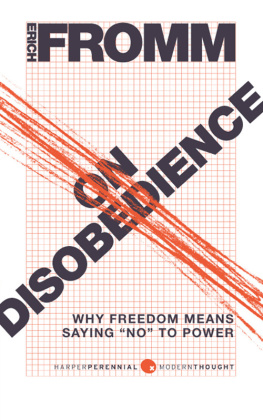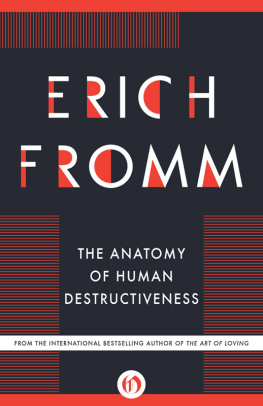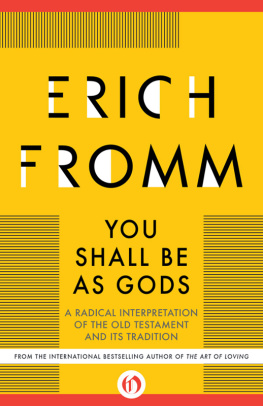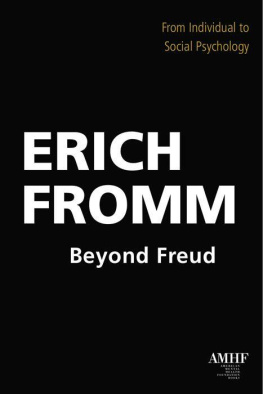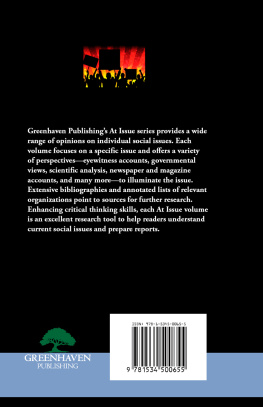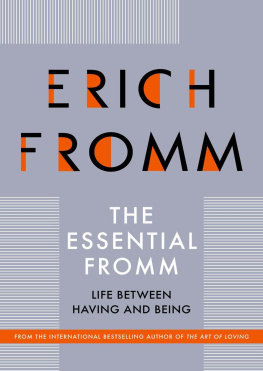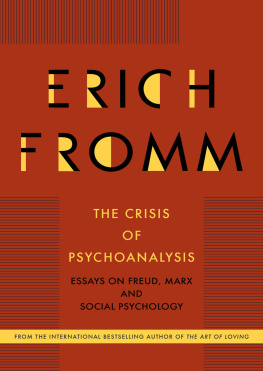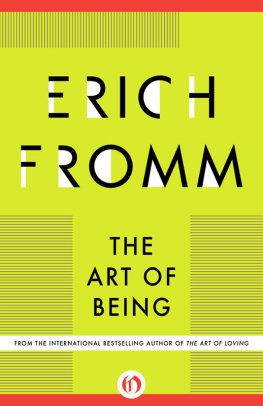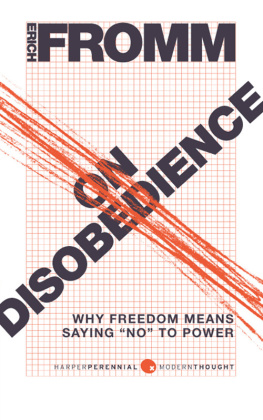Fromm - On disobedience and other essays
Here you can read online Fromm - On disobedience and other essays full text of the book (entire story) in english for free. Download pdf and epub, get meaning, cover and reviews about this ebook. City: New York, year: 1981, publisher: HarperCollins;Seabury Press, genre: Politics. Description of the work, (preface) as well as reviews are available. Best literature library LitArk.com created for fans of good reading and offers a wide selection of genres:
Romance novel
Science fiction
Adventure
Detective
Science
History
Home and family
Prose
Art
Politics
Computer
Non-fiction
Religion
Business
Children
Humor
Choose a favorite category and find really read worthwhile books. Enjoy immersion in the world of imagination, feel the emotions of the characters or learn something new for yourself, make an fascinating discovery.
On disobedience and other essays: summary, description and annotation
We offer to read an annotation, description, summary or preface (depends on what the author of the book "On disobedience and other essays" wrote himself). If you haven't found the necessary information about the book — write in the comments, we will try to find it.
Fromm: author's other books
Who wrote On disobedience and other essays? Find out the surname, the name of the author of the book and a list of all author's works by series.
On disobedience and other essays — read online for free the complete book (whole text) full work
Below is the text of the book, divided by pages. System saving the place of the last page read, allows you to conveniently read the book "On disobedience and other essays" online for free, without having to search again every time where you left off. Put a bookmark, and you can go to the page where you finished reading at any time.
Font size:
Interval:
Bookmark:
Chapter I
Disobedience as a Psychological and Moral Problem
F or centuries kings, priests, feudal lords, industrial bosses and parents have insisted that obedience is a virtue and that disobedience is a vice. In order to introduce another point of view, let us set against this position the following statement: human history began with an act of disobedience, and it is not unlikely that it will be terminated by an act of obedience.
Human history was ushered in by an act of disobedience according to the Hebrew and Greek myths. Adam and Eve, living in the Garden of Eden, were part of nature; they were in harmony with it, yet did not transcend it. They were in nature as the fetus is in the womb of the mother. They were human, and at the same time not yet human. All this changed when they disobeyed an order. By breaking the ties with earth and mother, by cutting the umbilical cord, man emerged from a pre-human harmony and was able to take the first step into independence and freedom. The act of disobedience set Adam and Eve free and opened their eyes. They recognized each other as strangers and the world outside them as strange and even hostile. Their act of disobedience broke the primary bond with nature and made them individuals. Original sin, far from corrupting man, set him free; it was the beginning of history. Man had to leave the Garden of Eden in order to learn to rely on his own powers and to become fully human.
The prophets, in their messianic concept, confirmed the idea that man had been right in disobeying; that he had not been corrupted by his sin, but freed from the fetters of pre-human harmony. For the prophets, history is the place where man becomes human; during its unfolding he develops his powers of reason and of love until he creates a new harmony between himself, his fellow man and nature. This new harmony is described as the end of days, that period of history in which there is peace between man and man, and between man and nature. It is a new paradise created by man himself, and one which he alone could create because he was forced to leave the old paradise as a result of his disobedience.
Just as the Hebrew myth of Adam and Eve, so the Greek myth of Prometheus sees all of human civilization based on an act of disobedience. Prometheus, in stealing the fire from the gods, lays the foundation for the evolution of man. There would be no human history were it not for Prometheus crime. He, like Adam and Eve, is punished for his disobedience. But he does not repent and ask for forgiveness. On the contrary, he proudly says: I would rather be chained to this rock than be the obedient servant of the gods.
Man has continued to evolve by acts of disobedience. Not only was his spiritual development possible only because there were men who dared to say no to the powers that be in the name of their conscience or their faith, but also his intellectual development was dependent on the capacity for being disobedientdisobedient to authorities who tried to muzzle new thoughts and to the authority of long-established opinions which declared a change to be nonsense.
If the capacity for disobedience constituted the beginning of human history, obedience might very well, as I have said, cause the end of human history. I am not speaking symbolically or poetically. There is the possibility, or even the probability, that the human race will destroy civilization and even all life upon earth within the next five to ten years. There is no rationality or sense in it. But the fact is that, while we are living technically in the Atomic Age, the majority of menincluding most of those who are in powerstill live emotionally in the Stone Age; that while our mathematics, astronomy, and the natural sciences are of the twentieth century, most of our ideas about politics, the state, and society lag far behind the age of science. If mankind commits suicide it will be because people will obey those who command them to push the deadly buttons; because they will obey the archaic passions of fear, hate, and greed; because they will obey obsolete clichs of State sovereignty and national honor. The Soviet leaders talk much about revolutions, and we in the free world talk much about freedom. Yet they and we discourage disobediencein the Soviet Union explicitly and by force, in the free world implicitly and by the more subtle methods of persuasion.
But I do not mean to say that all disobedience is a virtue and all obedience a vice. Such a view would ignore the dialectical relationship between obedience and disobedience. Whenever the principles which are obeyed and those which are disobeyed are irreconcilable, an act of obedience to one principle is necessarily an act of disobedience to its counterpart, and vice versa. Antigone is the classic example of this dichotomy. By obeying the inhuman laws of the State, Antigone necessarily would disobey the laws of humanity. By obeying the latter, she must disobey the former. All martyrs of religious faiths, of freedom and of science have had to disobey those who wanted to muzzle them in order to obey their own consciences, the laws of humanity and of reason. If a man can only obey and not disobey, he is a slave; if he can only disobey and not obey, he is a rebel (not a revolutionary); he acts out of anger, disappointment, resentment, yet not in the name of a conviction or a principle.
However, in order to prevent a confusion of terms an important qualification must be made. Obedience to a person, institution or power (heteronomous obedience) is submission; it implies the abdication of my autonomy and the acceptance of a foreign will or judgment in place of my own. Obedience to my own reason or conviction (autonomous obedience) is not an act of submission but one of affirmation. My conviction and my judgment, if authentically mine, are part of me. If I follow them rather than the judgment of others, I am being myself; hence the word obey can be applied only in a metaphorical sense and with a meaning which is fundamentally different from the one in the case of heteronomous obedience.
But this distinction still needs two further qualifications, one with regard to the concept of conscience and the other with regard to the concept of authority.
The word conscience is used to express two phenomena which are quite distinct from each other. One is the authoritarian conscience which is the internalized voice of an authority whom we are eager to please and afraid of displeasing. This authoritarian conscience is what most people experience when they obey their conscience. It is also the conscience which Freud speaks of, and which he called Super-Ego. This Super-Ego represents the internalized commands and prohibitions of father, accepted by the son out of fear. Different from the authoritarian conscience is the humanistic conscience; this is the voice present in every human being and independent from external sanctions and rewards. Humanistic conscience is based on the fact that as human beings we have an intuitive knowledge of what is human and inhuman, what is conducive of life and what is destructive of life. This conscience serves our functioning as human beings. It is the voice which calls us back to ourselves, to our humanity.
Authoritarian conscience (Super-Ego) is still obedience to a power outside of myself, even though this power has been internalized. Consciously I believe that I am following my conscience; in effect, however, I have swallowed the principles of power; just because of the illusion that humanistic conscience and Super-Ego are identical, internalized authority is so much more effective than the authority which is clearly experienced as not being part of me. Obedience to the authoritarian conscience, like all obedience to outside thoughts and power, tends to debilitate humanistic conscience, the ability to be and to judge oneself.
Font size:
Interval:
Bookmark:
Similar books «On disobedience and other essays»
Look at similar books to On disobedience and other essays. We have selected literature similar in name and meaning in the hope of providing readers with more options to find new, interesting, not yet read works.
Discussion, reviews of the book On disobedience and other essays and just readers' own opinions. Leave your comments, write what you think about the work, its meaning or the main characters. Specify what exactly you liked and what you didn't like, and why you think so.

